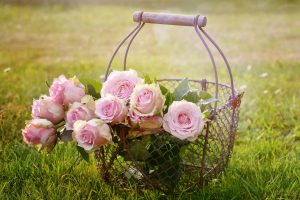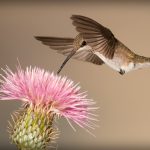If you’re interested in attracting pollinators to your garden, then the most important of the group are bees. They are considered the heroes of the pollinating world because of their eyes. Bees’ eyes are much more developed than other insect and bird species. That’s because they actually have five eyes. As a result, bees have a much wider range of color vision. They can also see objects in ultraviolet light.
You may be surprised to learn that bees don’t see the color red. Their foundation of color awareness is based on the colors blue and green as well as ultraviolet light. When bees look at red flowers, those flowers actually fade into the green foliage. Believe it or not, if you are a gardener who is somewhat afraid of bees or simply don’t want them to bother you as you garden, then wear red. Moreover, you may want to avoid wearing yellow because wasps and other stinging insects are attracted to that color.
The ideal colors for attracting bees to your garden are blue, violet, and purple.
You may also not be aware that there are markings on the petals of plants that provide something like a road map and helps direct bees to the nectar. Called nectar guides, these markings can be seen in the center of the plant where the nectar is located. The markings are actually a different color than the petals. In some cases, the nectar guides are not visible to humans on such flora as sunflowers and pansies. In this case, pollinating insects that can see ultraviolet light can see the nectar guides on these flowers.
Bees Are Threatened
Bees, the heroes of pollination, are under threat. Beekeepers have discovered that over half of their honeybee colonies population are dying every year. Some scientists have said that as much as 30 to 60 percent of the honeybee population are dying worldwide. In addition, nearly a quarter of the 46-bumble bee species in North America face extinction.
The threat to bees is due to the loss of habitat, chemicals, climate change, invasive species, parasites, and disease. They are also under threat because of a phenomenon called Colony Collapse Disorder, which is caused by mites that attack the hives. Some believe that the mites carry a fungus, parasites, bacteria or a virus or that insecticides are contributing to the problem.
Other dangers to bees include foulbrood, a contagious disease, and Nosema; digestive problems bees get in the winter when they are confined to their hives.

(Courtesy: Folkert Jongbloed)
This is a major problem because bees pollinate about 70 percent of flowering plants including fruits and vegetables that provide one-third of our food. Moreover, bees pollinate feed crops including alfalfa that’s necessary for feeding cattle.
Flowers And Bees Have A Mutual Beneficial Relationship
As gardeners, you are probably aware that flowers and bees have a mutual beneficial relationship. Plants offer flowering buds, sent, color and nectar for the bees and the bees pursue the nectar and move pollen to male and female flower parts and fertilize seeds resulting in the production of fruits, vegetables, and nuts.
What We Can Do To Help
Gardeners as well as non-gardeners can provide assistance to ensure that bees survive the threat. These include:• Planting bee-friendly plants and flowering herbs to help bees with feed.
• Consider changing your yard into a bee lawn.
• Avoid using chemicals to treat plants because they can adversely affect bees.
• Allow clover and dandelions to grow on your lawn to serve as sanctuary for honeybees.
• Don’t use chemical lawn treatments that can damage bee colonies when flowers are in bloom.
• Place a small bowl of fresh water outside or put a birdbath with stones that offers a shallow pool and save-haven for thirsty bees.
(Sources: Nature’s Tricks To Lure Pollinators, Pollinators At Work, and To Bee Or Not To Bee – A gardening Dilemma)






